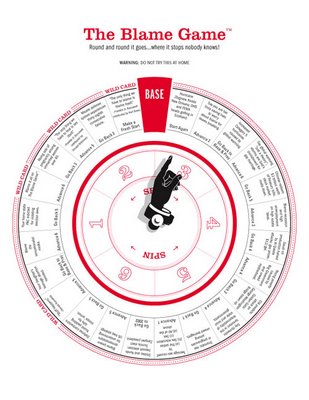Thursday, November 09, 2006
GOP in Recrimination Mode

There is crying and gnashing of teeth among some elements of the Republican Party following their rebuke in the midterms.
After minutes upon minutes of soul-searching, Republicans are now in recrimination mode. And the GOP's various factions all agree: This wouldn't have happened if the party had listened to us.
In the aftermath of the historic GOP losses Tuesday night, moderate Republicans quickly concluded that the party needs to be more moderate. Conservative Republicans declared that it should be more conservative. Main Street is angry at Wall Street, theo-cons are angry at neo-cons, and almost everyone is angry at President Bush and the GOP congressional leadership.
The party purges formally began yesterday, as Defense Secretary Donald H. Rumsfeld and House Speaker J. Dennis Hastert (R-Ill.) agreed to step down before they were pushed. Senate Majority Leader Bill Frist (R-Tenn.) had already decided to leave Congress, but GOP insiders said Tuesday's debacle should eliminate him from presidential contention in 2008.
By day's end, Republican fingers had pointed at every conceivable Republican scapegoat: ex-representative Mark Foley of Florida and his scandal-plagued colleagues, Republican National Committee Chairman Ken Mehlman, presidential adviser Karl Rove, even Sen. John McCain of Arizona.
Of course, everyone agrees that Iraq is a huge problem as well, although no one seems to think that getting rid of Rumsfeld will solve it.
The moderate Republican Main Street Partnership fired its first salvo on election night, unleashing a news release titled "Far Right Solely Responsible for Democratic Gains." Sarah Chamberlain Resnick, the partnership's director, complained that GOP leaders had rejected popular causes such as the minimum wage, embryonic stem cell research and lobbying reforms while ignoring health-care issues that did not involve Terri Schiavo. The result, she said, was that moderate suburban voters saw Republicans as extremists.
"This election isn't a repudiation of the GOP," Chamberlain said. "It's a repudiation of a handful of zealots, and a reminder that you can't build a majority party without securing the middle of the American electorate."


